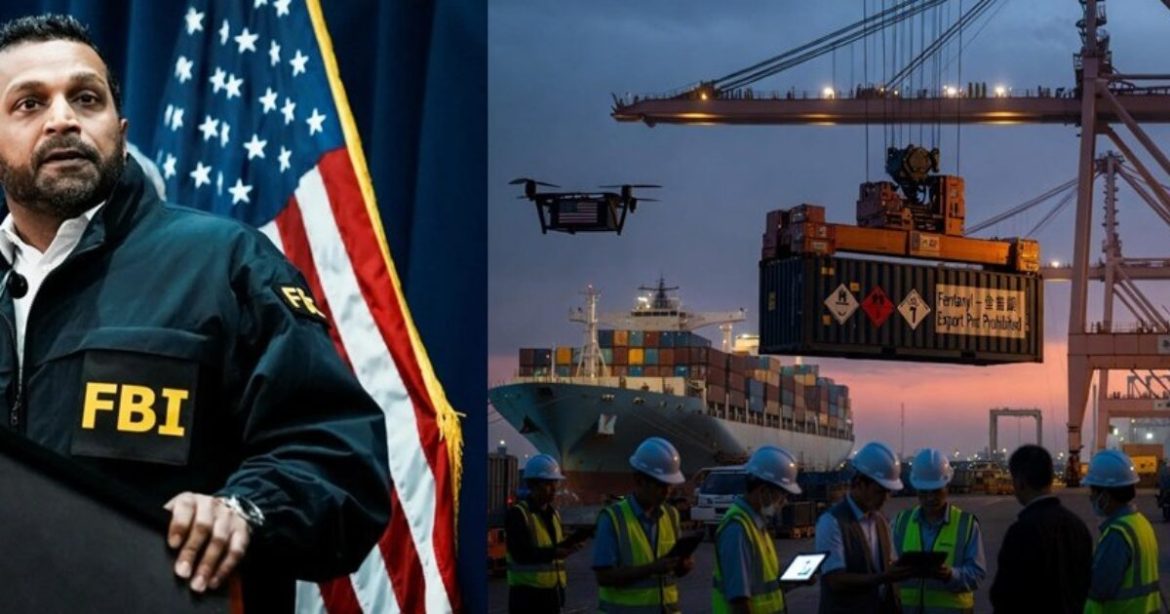

Kash Patel, President Trump, and the entire administration did a great job in getting China to agree to halt fentanyl precursor exports immediately. As for the promises of additional cooperation in law enforcement, China remains China, so don’t expect Beijing to follow through.
FBI Director Kash Patel met with Wang Xiaohong, China’s Minister of Public Security, a close confidant of Xi Jinping. The meeting took place at the Ministry of Public Security headquarters in Beijing, marking the first time in more than a decade that an FBI director had traveled to China for a meeting with his counterpart. The main focus of the discussions was ending the fentanyl crisis.
Negotiations had been underway for months. Attorney General Pam Bondi engaged with her Chinese counterpart, while Secretary of State Marco Rubio worked to establish the policy framework needed to shut down the fentanyl pipeline. The visit followed President Trump’s October 2025 meeting with Xi Jinping in South Korea, where Xi first agreed to act on fentanyl precursors.
Patel announced the results of the meeting at a White House briefing on November 12. He said the Chinese government fully acknowledged his engagement in Beijing and described the access he received as unprecedented. According to Patel, Chinese officials admitted their precursors are used to produce fentanyl and agreed to designate and list all 13 fentanyl precursors, as well as control seven chemical subsidiaries tied to the supply chain. China agreed to implement these measures immediately. U.S. and Chinese officials finalized the plan during the meeting.
Patel stated that President Trump had effectively shut off the pipeline responsible for killing tens of thousands of Americans. “These substances are now banned,” he said, adding that Mexican drug trafficking organizations and other DTOs will no longer be able to use them. Patel said this agreement has already saved tens of thousands of lives and credited the achievement to President Trump, the Attorney General, the Department of Justice, the FBI, and Ambassador Perdue in China.
During his meetings with his counterpart, Patel discussed expanding several areas of law enforcement cooperation, focusing on criminals who have stolen billions from both Chinese and American victims through cyber scams and telephone fraud. He emphasized joint efforts to combat online crimes targeting children, which both governments acknowledged as a growing threat.
Patel and Chinese Vice Minister of Public Security Xu Datong also addressed cooperation to ensure violent criminals face justice, including cases involving cross-border or transnational networks. Patel framed these efforts as essential to protecting American citizens and disrupting criminal organizations operating across multiple jurisdictions.
While the ban on fentanyl precursors is welcome news, China’s promises of broader cooperation may prove meaningless. Given China’s long history of making commitments and then failing to deliver, the skepticism is justified. China has repeatedly used law enforcement and counter-narcotics cooperation as leverage, extending help when relations improve and cutting it off when relations deteriorate.
In 2019, China added all fentanyl-related substances not already scheduled to its controlled substances list, and joint U.S.–China investigations resulted in convictions for trafficking fentanyl to the United States and Canada. By late 2021, that cooperation collapsed. No prosecutions followed, DEA agents were restricted, and after Nancy Pelosi’s visit to Taiwan, China announced an end to cooperation on drugs, fentanyl, wildlife trafficking, and other issues.
The pattern repeated again in 2023 and 2024. After the Biden–Xi summit in November 2023, China claimed it shut down some suppliers and blocked certain payment accounts, and resumed sending real-time suspicious shipment reports to the International Narcotics Control Board (INCB) for the first time in years. Specialists in criminal drug markets, however, warned that the new regulations appeared to be little more than public relations, with no evidence that China intended to enforce them. Analysts have long noted that China subordinates anti-crime cooperation to its strategic interests, turning cooperation on and off based on geopolitical calculations.
Investigators for a U.S. House subcommittee found evidence that Chinese government agencies subsidize the export of fentanyl precursors, even as China claims to be cracking down on them. Chinese chemical exporters are profitable, and targeting them conflicts with Beijing’s industrial policies and economic goals. China also has no domestic synthetic opioid crisis, so there is no internal political pressure to stop fentanyl precursors, which primarily fuel an American epidemic.
The broader law enforcement picture is equally bleak. The United States has no extradition treaty with China, severely limiting cooperation on cybercrime and transnational offenses. China routinely refuses to extradite its own citizens on sovereignty grounds and often drags out or ignores requests.
Despite having the world’s most advanced domestic surveillance system and a vast extraterritorial enforcement apparatus used against dissidents, Beijing has shown no willingness to apply similar capabilities to blunt the global illicit opioid epidemic.
China has the capacity to crack down on these operations whenever it chooses. It does so aggressively in its own anti-corruption drives and when pursuing political enemies. But when cooperation benefits its strategic interests, it offers symbolic gestures, implements minimal measures for appearance, and then quietly retreats.
The post Kash Patel’s China Meeting: Fentanyl Export Ban and Vague Promises on Cooperative Law Enforcement appeared first on The Gateway Pundit.

